How blending collaboration & connect is transforming public affairs in India
COVID-19 has effected a transformation in the way government and businesses function and has precipitated an environment of cooperation. The pressure to perform is shaping the outlook of each stakeholder towards the other and changing the concept of ‘connect’ and ‘access’ through transparency, receptiveness and, above all, mutual respect. In a recent session of Creative Sandbox – a platform for industry leaders to share their perspective and opinion – hosted and moderated by Nikhil Dey, Vice Chair, Weber Shandwick, industry stalwarts got together to share their views on the adjustments and alignments that the industry has undergone to adapt with changing times.
Reflecting on the ideas of relationship and ‘access’, Swati Rangachari, Chief Corporate Affairs Officer, Sterlite Technologies, expatiated that ‘relationship’ in this particular business depends upon two things: the factor of trust built on mutual respect and the value that is delivered through the equation. To be able to ensure that these factors are brewed into a successful concoction, one has to invest in relationships. Simultaneously, there is a need to understand that the person in the government has an objective to deliver or a goal to achieve and the corporate agenda is only a part of that whole. Therefore, it becomes imperative to see that the value created by the business deliverson those objectives.
On a similar vein, Raju Kapoor, Director – Corporate Affairs, FMC Corporation, stressed on the definitive value of ‘connect’, but opined that the concept is pivoting on transparency and openness. And the fact that “in the past, you would try to buy something out. Now, you try to sell something out.” The sense of collaboration, in his experience, saw a big shift during the Covid-induced lockdown. Suddenly, as he said, those on the side of the administration were more accessible and more amenable. And this threw up a new opportunity to align business objectives with government mandates.
Amardeep Singh Ahluwalia, Senior Vice President – Corporate Affairs, Jubilant Bhartia Group, drew insights on the point from his own experience. He established the effort, the perseverance and the continuous communication that the industry had to carry out with the relevant government ministries and officials to push the government to open up alcobev sales, which was prohibited with the initiation of the lockdown. And extending on Raju’s view on a sense of collaboration, he said that the experience is similar with global stakeholders as well. As he said, both his global counterparts from the business side as well as bureaucracy are available and accessible.
For Latika Taneja, Director – Public Policy and Government Relations, South Asia Mastercard, the experience was different. Moving recently into the function of public policy, the lockdown imposed a veritable challenge of ‘building relationships’. While the transition to phone and virtual mediums posed an impediment, she was also surprised to the way this transition was adapted by the government officials and bureaucrats that enabled her to bridge the ‘access gap’.
Prepare, and prepare some more
The other aspect that found unanimous acceptance in terms of its increasing importance is research. To Swati, the preparedness of the other side or the uptake ability of the person sitting on the opposite end of the table have necessitated investment in an in-house research and analysis team. For Latika, COVID has precipitated the need to learn and the need to do one’s homework to be able to talk on point and defend one’s position. With shortening windows to communicate, content and strategy have become relevant. This underlines a significant shift, in terms of the speed with which PA teams are now required to respond to requests from stakeholders. Preparedness is the key to addressing this need for speed.
Finally, there is collaboration at the industry level whose usual dynamics are undergoing a paradigm shift. For Raju, peers are breaking out of their silos to collaborate at a larger level, rallying the cause of the industry and making their own agenda or mandate a part of it. As per Amardeep, the increasing engagement with the central government is necessitating a collective approach to demonstrate a united front to achieve objectives. In Latika’s experience, collaboration at the level of industry associations and think tanks are also playing a crucial role in outreach and delivery. In this regard, she cited Mastercard’s collaboration with Niti Aayog to work with the government in successfully revoking the administration’s earlier stance on regulating the limit of digital payments.
For these industry leaders, enriching relationships and an ensuring strategy is at the centre of everything they do. As Saptarshi Dutta, Vice President – Public Affairs, Weber Shandwick, echoed, the dynamic of the function itself – balancing out its purpose and intent to establish why corporate affairs exist – has reached a point of redemption.






Share
Facebook
YouTube
Tweet
Twitter
LinkedIn